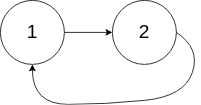Linked List Cycle II - An easy and a difficult solution
Problem Statement:
Given the head of a linked list, return the node where the cycle begins. If there is no cycle, return null.
There is a cycle in a linked list if there is some node in the list that can be reached again by continuously following the next pointer. Internally, pos is used to denote the index of the node that tail's next pointer is connected to (0-indexed). It is -1 if there is no cycle. Note that pos is not passed as a parameter.
Do not modify the linked list.
Example 1:

Input: head = [3,2,0,-4], pos = 1 Output: tail connects to node index 1 Explanation: There is a cycle in the linked list, where tail connects to the second node.
Example 2:

Input: head = [1,2], pos = 0 Output: tail connects to node index 0 Explanation: There is a cycle in the linked list, where tail connects to the first node.
Example 3:

Input: head = [1], pos = -1 Output: no cycle Explanation: There is no cycle in the linked list.
Constraints:
- The number of the nodes in the list is in the range
[0, 104]. -105 <= Node.val <= 105posis-1or a valid index in the linked-list.
Follow up: Can you solve it using O(1) (i.e. constant) memory?
Solution:
Easy method is to use hashset and traverse. If you find an element already present in hashset, return it.
ListNode *detectCycle(ListNode *head) {
ListNode *curr = head;
unordered_set<ListNode *> S;
while (curr)
{
if (S.find(curr)!=S.end()) return curr;
S.insert(curr);
curr = curr->next;
}
return NULL;
}
O(n) time and O(n) space complexity.
For O(1) space solution, we can use fast and slow pointers. If we encounter NULL ever, means there was no cycle. If cycle is present the two pointers will meet. Then we again traverse both slow and start nodes till they meet and then return it:
ListNode *detectCycle(ListNode *head) {
if (!head || !head->next) return NULL;
ListNode *start=head, *slow=head, *fast=head;
while (fast->next && fast->next->next)
{
slow = slow->next;
fast = fast->next->next;
if (slow==fast)
{
while (start!=slow)
{
slow = slow->next;
start = start->next;
}
return start;
}
}
return NULL;
}